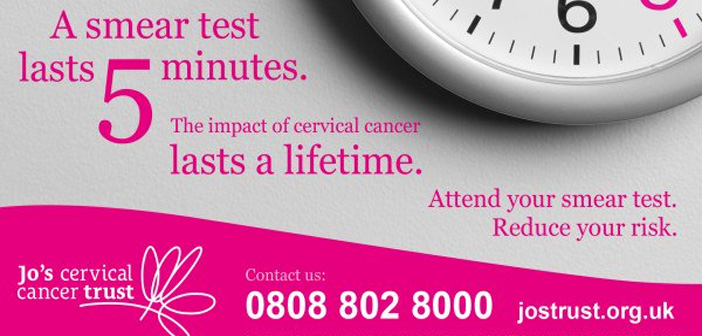JO’S Cervical Cancer Trust is warning that failings in the delivery and development of the cervical screening programmes have led to declining and unequal opportunities for women to access the potentially life-saving test.
Cervical screening, which prevents 75 per cent of cervical cancers, is largely delivered in GP practices with five million women invited every year in the UK. However, new research by Jo’s Cervical Cancer Trust has found a worrying one in eight women find it difficult or even impossible to book an appointment. 7.4 per cent of women were told no appointments at their GP practice were available the last time they tried to book.
Opportunities to access screening through sexual health services have been rapidly declining and are unequal across the UK. Since 2013 there has been a 52 per cent reduction in samples taken through sexual health services in England and a 42 per cent reduction in Wales. This is further concerning as there is a greater risk of cervical cancer among those accessing the service. In England 5.9 per cent of samples taken at a GP come back as abnormal compared to 7.9 per cent in NHS Community Clinics (mainly sexual health services) and 11.5 per cent in GUM clinics.
The charity is highlighting a number of factors which it believes are contributing to declining attendance, including a lack of long-term planning and oversight, a complex commissioning environment, lack of incentive and resource for screening to be delivered in sexual health services and IT systems preventing innovation.
It identifies certain groups of women who are further disadvantaged as a result of the current delivery including transient populations, those with a physical disability and women who have experienced sexual violence.
The charity is calling for greater accountability and responsibility to be taken to address the problems that exist:
- An audit to be carried out in each country with Government, NHS, commissioners, providers and public health specialists working together to identify the problems that exist
- The Department of Health and Social Care, along with NHS England and Public Health England, to conduct an immediate review of the IT landscape in England and commit to investing in a system which is fit for purpose, fit for the future and safe
- Women having to wait a maximum of four weeks for an appointment in primary care with more early morning, evening and weekend appointments made available in GP practices
- An integrated approach to commissioning and delivering screening taken across primary care and sexual health with adequate resourcing and funding, including a national budget line for cervical screening in sexual health services in England
- Funding for large-scale pilots on self-sampling, which 80 per cent of women would prefer to use
- Innovation in the delivery of the programmes including more digital methods of communicating with women
One in four women don’t attend cervical screening when invited and during Cervical Screening Awareness Week Jo’s Cervical Cancer Trust will be addressing the different barriers to attendance and talking about how the test can be made easier for more women and people with a cervix to attend. Find out more at www.jostrust.org.uk/csaw and join the campaign using #SmearTestsSaveLives




